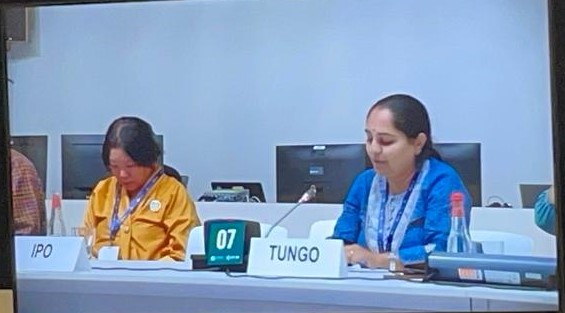


1st Dec 2023 marked the commencement of the World’s largest Annual Climate Summit – “The COP-28”. SEWA as member of the ITUC delegation to the COP28 was invited on the plenary – “First Global Stocktake: High-level Event on Adaptation” by the ITUC.
As a part of ITUC (TUNGO), SEWA represented the voice and gave visibility to the various innovative approaches adapted by the informal workers – especially women workers, across the globe to combat climate change. The panel consisted of ministers and stakeholders, multi-laterals like FAO from about 30 nations across the globe. The session was presented by Her Excellency- Razan-Al-Mubarak, UN-Climate Change High Level Champion-COP-28 Presidency and presided over by the High-Level Committee Chair, COP-27 president, His Excellency Sameh Shoukry, ministry of Foreign Affairs Egypt.
Sharing the reality and challenges of its member, SEWA emphasized the point that these women workers are the poorest of the poor. Majority of them face multi-faceted challenges and are unregistered, leaving them outside the purview of government programs and policies.
Frequent climate shocks affect these women disproportionately, pushing them deeper into the vicious circles of debt and poverty. However, climate change impacts on these informal sector workers often go unheard. National Disaster mitigation and relief plans rarely focus on mitigating the impact of climate change on these workers and their livelihoods.
These are workers who do not enjoy adequate labor rights, or security to enable them to respond to the dire impacts of climate change. More than four billion people in the world do not have any kind of social protection. These most vulnerable in both low-and high-income countries need access to health care, unemployment benefits, and other social protection benefits to deal with the impact of a climate crisis that endangers their livelihoods.
And yet, SEWA’s experience of organizing these women have also shown that due to their intrinsic caring nature, women take on the role of “nurturers” of families, local communities and of the environment.
Therefore, SEWA has proposed to set-up a Global Climate Resilience fund for Women to deal with the impacts of climate crises that enables them to stabilize their livelihoods.
The UN and ILO have established a ‘Global Accelerator’ to help ensure global financing with a target to create 400 million jobs and extend social protection to four billion people currently without coverage.
SEWA has also set up the Global Climate Resilience Fund – an innovative pool of blended finance to build the resilience of poor informal sector women workers and their tiny and micro-enterprises.
Good social protection and access to climate finance are integral parts of Just transition and essential for good adaptation policies. They must receive a strong reference in the Global Stock-take for enabling greater resilience in the face of the climate crisis.
As the 2.5 million members of SEWA have come together to take Climate Action, there is a need for the national governments and all governments of the world do so too. When it comes to Climate Action… “Ham Sab Ek Hai” …. We are all one… and as our sisters always say…. Together… we shall overcome…. So, let’s come together and resolve the climate crisis.